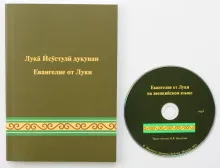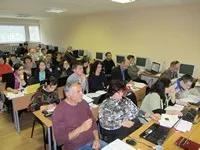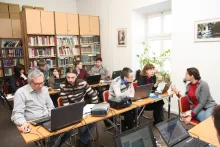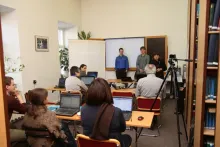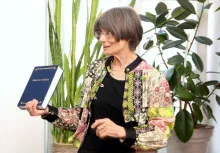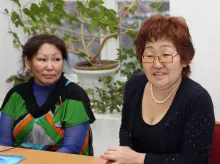news-26.02.14
On 25 February, 2014, Fr. Cosmas Shartz, an Orthodox monk from the Monastery of St. John of San Francisco (Manton, CA), gave a talk to the IBT staff and assembled guests. Fr. Cosmas shared his experience of working in the late 1990s and early 2000s to produce the English-language Orthodox Study Bible. The full title of this publication is The Orthodox Study Bible: Ancient Christianity Speaks to Today's World.
new-pub-17.01.14
At the end of 2013, IBT published a new edition of Luke's Gospel in the Evenki language of Siberia. Since this language is highly endangered and most Evenkis do not have much experience reading in their mother tongue, this edition was printed together with the Russian Gospel of Luke in a parallel column as an aid to comprehension. An audio recording of the Evenki text, read by the translator, Nadezhda Bulatova, was released on CD together with the book.
news-23.11.13
In mid-November the Institute for Bible Translation held a week-long seminar on translating the poetic books and Wisdom Literature of the Old Testament. The course was attended by 40 participants - translators, editors, co-ordinators and consultants from 15 IBT and SIL Bible translation projects (Avar, Agul, Adygei, Ingush, Kabardian, Kalmyk, Karakalpak, Komi Zyryan, Kumyk, Lezgi, Mari-Meadow, Mordvin-Moksha, Tabassaran, Tajik and Udi).
news-18.03.13
12-15 March 2013 IBT hosted a workshop, whose participants were mostly exegetical advisers. The seminar was devoted to the study of a special software programme called FLEx (full name - FieldWorks Language Explorer), a product of SIL. This programme allows the user to record lexical material, and then to manage, create and export glossaries, to create interlinear texts to analyze features of the discourse of the language, to study the morphology of the language, and also to collect and organize materials related to the target language culture.
news-18.02.13
From 12 to 16 February 2013 IBT held in its office a workshop for 14 participants from 10 translation projects (Abkhaz, Avar, Chukchi, Digor, Kalmyk, Kumyk, Lak, Lezgi, Nanai and Nogai). Among them were future Bible translators, philological editors, exegetical advisers and comprehension testers. All the participants were professionals and experts in their own fields of knowledge. But in the near future they will have to face a new challenge - to master the art of Bible translation.


